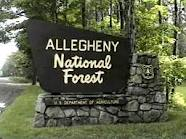The Allegheny Defense Project has provided this report, abbreviated below from its appearance in EcoWatch.org:
A federal judge has scheduled argument for July 2, 2012 (9 a.m., in the Erie Federal Courthouse) regarding recent motions in litigation over oil and gas drilling in the Allegheny National Forest. U.S. District Court Judge Sean McLaughlin ordered the arguments in the case, Minard Run Oil Co. v. U.S. Forest Service.
The litigation began three years ago after the Forest Service entered into a settlement agreement with three conservation groups—Forest Service Employees for Environmental Ethics, Allegheny Defense Project and Sierra Club. Under the settlement, the Forest Service agreed to undertake “appropriate” environmental analysis of proposed oil and gas drilling projects prior to authorizing access across Allegheny National Forest lands.
The plaintiffs in the litigation, Minard Run Oil Co. and PA Independent Oil and Gas Association, sued the Forest Service and the three conservation groups, claiming the settlement exceeded the Forest Service’s authority to protect Pennsylvania’s only national forest from the impacts of oil and gas drilling.
In December 2009, Judge McLaughlin granted the plaintiffs’ motion for a preliminary injunction, which blocked the settlement from going into effect while the case was being litigated. Both the Forest Service and the conservation groups appealed that preliminary decision. In September 2011, the U.S. Court of Appeals for the Third Circuit upheld Judge McLaughlin’s preliminary decision. According to the courts, because the Forest Service does not own the mineral rights beneath 93 percent of the Allegheny National Forest, the agency cannot regulate access to the mineral estate, even though that access directly impacts national forest lands through extensive road, well site and pipeline construction.
How should the case should proceed? The conservation groups want Judge McLaughlin to reconsider his preliminary decision because of new research into the history of the creation of national forests in the eastern U.S. The oil and gas plaintiffs want Judge McLaughlin to simply convert his previous preliminary decision into a permanent injunction against the Forest Service. That would effectively bar the Forest Service from attempting to implement any measures to mitigate the environmental impacts of most oil and gas drilling in the Allegheny National Forest—a result that is already contributing to cross-state pollution entering New York.
For example, the New York Department of Environmental Conservation (NYDEC) recently filed an administrative complaint against U.S. Energy Development Corporation because of sediment pollution from its oil and gas operations in Pennsylvania’s Allegheny National Forest. The amount of sediment runoff from oil and gas roads in the Allegheny National Forest is staggering. A recent report by Penn State’s Center for Dirt and Gravel Road Studies concluded that oil and gas roads in the Allegheny National Forest produce 450 percent more sediment pollution than other public roads in Pennsylvania. The Forest Service should obviously be allowed to regulate to protect our forested watersheds from that kind of reckless pollution.
According to the courts, however, the Forest Service is powerless to regulate this pollution in the Allegheny National Forest. The courts and the oil and gas industry assure the public that this does not mean that oil and gas drilling will go completely unregulated in the Allegheny National Forest because the Pennsylvania Department of Environmental Protection (PA DEP) still regulates oil and gas drilling at the state level. Of course, if the PA DEP were doing its job, the NYDEC would not have to file an administrative complaint against U.S. Energy for sediment pollution originating in Pennsylvania.
The fact is, the PA DEP sees itself as a facilitator of oil and gas drilling rather than a regulator. That is why the Forest Service must be allowed to regulate to protect the Allegheny National Forest—and it is precisely why eastern national forests, including the Allegheny National Forest, were created in the first place.
[ .. .. .. .. .. ]
There is nothing in the congressional record indicating that Congress did not intend for the Forest Service to regulate private oil and gas drilling activities in eastern national forests. In fact, just the opposite is true. The congressional record reveals that Congress intended the Forest Service to have the same power over eastern national forests as it had over national forests in the western U.S. That would include the authority to require private oil and gas companies to implement reasonable mitigation measures to reduce their environmental impact in the Allegheny National Forest.
Hopefully, we can get quick responses from the courts to resolve the issues in this case because the Allegheny National Forest, indeed public lands across the nation, need the full protection that federal law can provide. Previous background information is here.
Visit EcoWatch’s FRACKING page for more related news on this topic.

